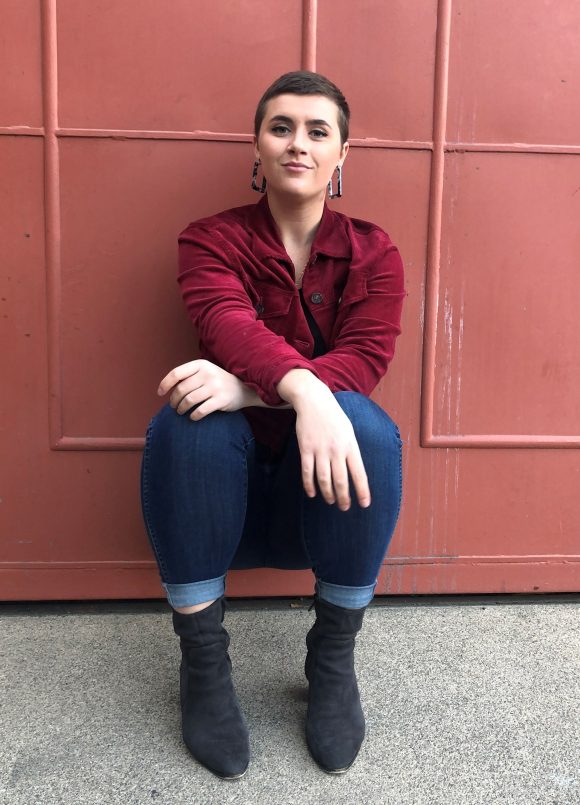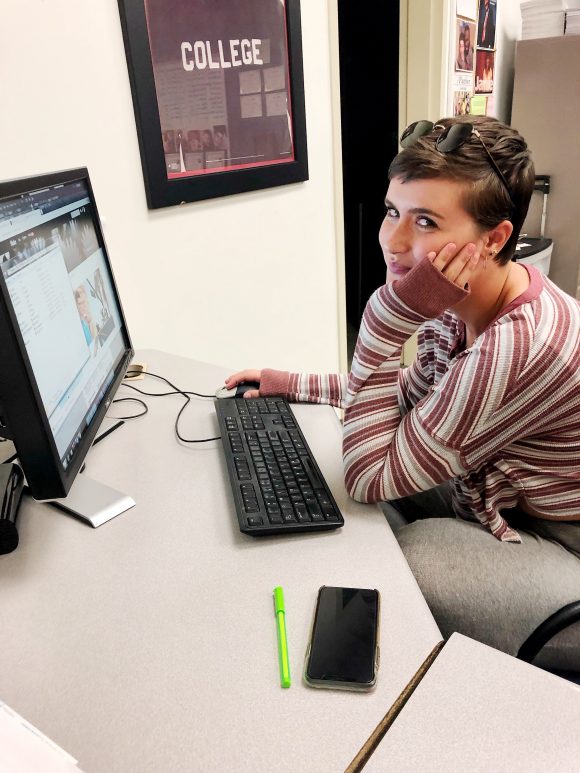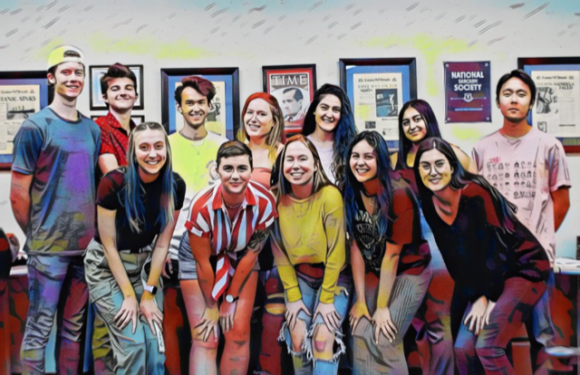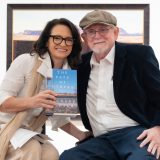
Pushing the Boundaries A Q&A with the The Panther Editor-in-Chief
February 14, 2020
Back in 2017, Wilkinson senior Louisa “Lou” Marshall (‘20) set in motion a chain of events that would turn her into one of the most prolific student journalists in the country.

Louisa “Lou” Marshall (‘20) is a History major, Political Science minor, and the Editor-in-Chief of Chapman’s student newspaper, The Panther.
As a dance major at New York University, experiencing the 2016 election in the Big Apple brought out an innate curiosity in her. “Being engaged with the world around me inspired me to change up my career,” she said. “I became interested in understanding why things were the way they were.”
In her sophomore year, Marshall moved back home to Southern California enrolling in Chapman and changing her major to History with a minor in Political Science. That’s when she began writing for The Panther, Chapman’s independent student newspaper.
Since then, Marshall has gone on to have multiple journalistic experiences. She interned for the Hollywood Reporter at the dawn of the #MeToo movement. Her work and career have been featured in the OC Register, OC Weekly, Student Press Law Center, and FIRE. She is currently an intern on NBC LA’s Investigative Reporting Team.
But one of the most meaningful experiences she’s had thus far has been serving as editor-and-chief of The Panther. Marshall has led the newsroom as they tackled controversial stories like propaganda from a white supremacist group on campus, School of Communication Dean Lisa Spark’s congressional campaign, and the opening of Chapman’s Center for Media Integrity. We are Wilkinson sat down with Marshall to chat about her time as Editor-in-Chief of The Panther.
—
We are Wilkinson: So you’ve already had an impressive portfolio of work covering a range of stories. Which story are you proudest of?
Lou Marshall: One of the stories I am most proud of is the George Bush coverage that we did. And not necessarily the actual coverage of the event itself, but more because of the stand the newspaper took on it.
The school communicated to The Panther that George Bush’s office would have to review any article of ours before publication, but I declined due to journalistic integrity. I was really proud of us for standing by our morals when it would’ve been really easy to cave. I think people in authority over student journalists have a tendency to underestimate just how capable we are.
“I think people in authority over student journalists have a tendency to underestimate just how capable we are.”
WAW: So when do you know that you’ve written a good story?
LM: The stories I’ve always been most proud of have been the ones that actively serve the community, like our recent story on the arrest of a Chapman student who was suspected to be under the influence, disrupting his class with racial and homophobic profanities. When I have students messaging me or messaging The Panther on Instagram or Facebook saying “thank you for covering this, we’re scared for our safety. Please keep us updated.”
At the end of the day, free press and journalism and working for a newspaper is about serving the community that reads what it is you write. So if I had any kind of hand in assuring students of what was happening on their campus or impacting them to consider their safety in this kind of situation, then that is the best feeling I could get from this job.
WAW: So I would be remiss if I didn’t ask how being a Wilkinson student has helped you become the journalist you are today.
LM: I love Wilkinson. I think we’re the best school on campus.
Wilkinson has armed me with the knowledge to be able to cover just about everything. I’m trying to push myself to take classes I wouldn’t have taken otherwise. In the History Department, I’m taking classes on Apartheid, the history of technology, and the Middle Ages. I’ve run the gamut of content and topics. Collectively, all of that has enabled me to approach my work with a lot of insight.
“Wilkinson has armed me with the knowledge to be able to cover just about everything. “
For instance, with the impeachment trial, I wouldn’t be able to write with authority about an impeachment trial if I wasn’t a history major and a poli sci minor and knew how an impeachment trial worked. It’s so intimately woven, the relationship between journalism and history. And we can really get far into all these different ways the humanities are important.
Wilkinson’s really challenged me to think critically about the work that I do. Going to the source, doing the research — those kinds of tangible skills are important. But not only that, questioning those sources, questioning the perspectives of the writer, not accepting things for face-value has been one of the most valuable things I will have taken out of my time here.

WAW: So, looking forward, if you had to write a story about anything now or in the future, what would it be?
LM: If there was one story or arc of story that I want to cover, it would be to tell the story of women who have survived sexual assault or rape. And it’s really complicated — a lot of women understand what coming forward can do to them…Every situation is complicated, but if I could provide a voice and a platform for them to be seen and heard, I would want to do so.
WAW: As you are graduating in May, what advice do you have for aspiring student journalists?
LM: For inspiring student journalists, get involved with your campus, join your student newspaper. It has been the highlight of my college career. I will leave feeling very proud of the work that I did while I was here.
Also, don’t let anyone push you around. I have been underestimated as a student journalist more times than I can count, to the fault of the person who underestimated me in the first place. Just go for it, don’t let anything hold you back and don’t let someone brush you off because of your age.
“Don’t let anyone push you around… just go for it, don’t let anything hold you back and don’t let someone brush you off because of your age.”
WAW: And finally, what would you like alumni and parents to know about being a student journalist?
LM: I’ve gotten the opportunity to engage with a lot of alumni. Alumni, please continue to engage with your Chapman community. I think there is a collective experience that Chapman students share that we can only relate to people who have been students on Chapman’s campus.

2019-2020 Staff of The Panther. Top Left, clockwise: Braeden Lueken, Luca Evans, Zach Davis, Emma Reith, Jasmin Sani, Mitali Shukla, Kento Komatsu, Kali Hoffman, Carolina Valencia, Kate Hoover, Louisa Marshall, Abbie DeMuth
For parents of Chapman students who want to be journalists, just support your students. They’re doing something that takes a lot of guts. Becoming a journalist right now is really daunting. It’s a really contentious time to want to get into this business, and it takes a lot of courage to look at this field and to look at the climate of this field and say, “that is what I want to do.” So please just throw your support behind them.
“For parents of Chapman students who want to be journalists, just support your students.”

